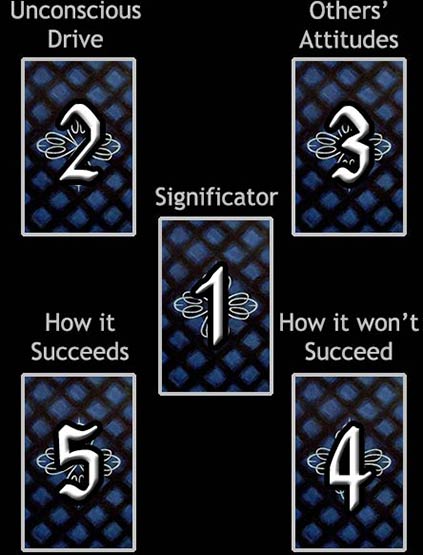Game Plan Spread

Difficulty: Easy
When a person has a certain plan in mind, this simple five-card spread presents a choice, hinting at what action or attitude should be taken for their plan to succeed, and what should be avoided to help the plan work out for the best.
The initial card is laid in the centre of the layout, the significator. The following four cards are laid out clockwise around the significator.
In this spread, the second card is about what drives the reader, but also says they are not fully conscious of this, perhaps even completely unaware of it. It provides a hint as to the reason they strive for their goal.
The third card uncovers what others think of the reader and their goals. The reader may or may not be aware of this. Sometimes other people factor into the plans (and sometimes they don't).
The fourth card suggests what not to do. If things are permitted to go down this path, the plan will collapse.
The fifth card is a hint as to how to make this plan work out favourably. The idea this card presents should be followed to make the plan successful. It is the differences between Cards #4 & #5 that should be noted, as the differences provide important clues.
Your Game Plan Reading
Unconscious Drive The High Priestess |
External Influences The Chariot |
|
Significator The Sun |
||
How it Will Succeed Temperance |
How it Will Not Succeed Death |

The Sun
The sun can be seen clearly and it dominates the picture. The last walls are being conquered and in between them flowers are already growing. This lets us suspect that the difficult path is at an end. The path, which continues, can already be seen beyond the wall.

The High Priestess
The two eyes indicate that the High Priestess perceives the polarity in their dualism but doesn't take any valuation into account. The light and the dark side can be seen, as well as the waning and waxing moon and the full-moon, which unites and contains both sides.
The water and the two fish also symbolise the connection, the flow of energy and the dualism. The feather stands for the High Priestess' sensitiveness, the pomegranate for her fertility.

The Chariot
The chariot itself is portrayed by the wheel. It has eight spokes, a symbol for the process of development. The shaft symbolises the centre and also the number nine, which completes the cycle. Hub and shaft are on fire and stand for sexual energy. Origin, the wheel's background, and destination, the celestial body's background, are the same colour, violet, which stands for the spiritual.
The dominating yellow in the picture depicts joy of living. The water at the bottom indicates frankness or naivety, but also emotions to be conquered, such as caution or fear. Black and white reins, held in the right and left hand, show different directions and ambivalences, which have to be brought into harmony to make the journey possible. The next part of the journey, which lies ahead of the coach driver, the material world, represented by green, square fields, opens up within all this.
Libra's symbol (justice) shows that one has to reckon with consequences for any mistakes. The section at the top leads into the night. The coach driver does not encounter the sun, as to be expected, but instead the moon and stars. He will meet intuition and the unconscious.

Death
The circuit of coming and going is symbolised by the serpent, which frames the picture and bites its own tail. The red background portrays sunset, or as the case may be, sunrise. The house and the tree, representatives for the element earth, have fallen into decay and are bare. The three tombstones show the headgear of the pope, the king and the farmer. At death there is no difference.
The skeleton's hand comes from the left and holds a blue scythe, which seems to be a mixture between a sceptre and a sword. The leaf, which is growing out of it, shows that death, due to its quality allowing old things to fade away, makes new growth possible.
The water symbolises the river Styx, which has to be crossed at death so as to reach the next world. The colour blue in the picture stands for disconnection and purification. Like its younger brother sleep, death also has a cleansing property, which is particularly emphasised by the whiteness of the skeleton's hand and the blade of the scythe. What is interesting (I only realised later) is that the scythe's blade itself gives the hint of a crescent moon.

Temperance
The path through the underworld can be seen which eventually leads into light. The path is edged with lilies, the underworld flowers. The abstract archangel Michael is helping to find the right composition for the flow of energy, in other words is on the way through the subconscious (forgotten) to keep a minimal contact going with the conscious e.g., by transmission (documents...)
